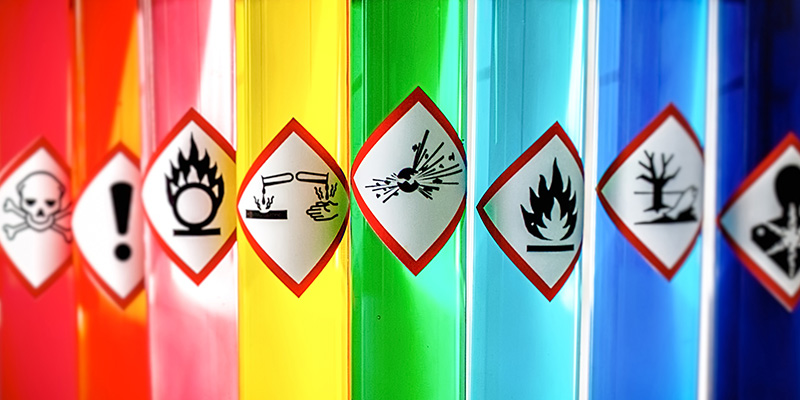Environmental Consulting
CFATS Compliance
The Chemical Facility Anti-Terrorism Standards is a program put in place by the Department of Homeland Security to reduce the security risks associated with possessing specific hazardous chemicals (referred to as Chemicals of Interest). The program focuses on reducing the impact of a potential terrorist attack targeting these COIs by regulating covered chemical facilities.
Trinity assists with Chemical Facility Anti-Terrorism Standards (CFATS) compliance, from applicability determination through DHS authorization and compliance inspections, as well as periodic audits. Trinity has valuable experience in each critical step of the CFATS program.
Conducting Applicability Determinations
- Evaluating facility chemicals for CFATS applicability
- Preparing threshold calculations for Chemicals of Interest
- Preparing non-applicability determinations to document the facility's compliance status
- Evaluating alternatives to opt out of the CFATS reporting requirements
Performing Top-Screen Analyses (TSA)
- Preparing a TSA using DHS's Chemical Security Assessment Tool (CSAT)
- Providing CSAT and Chemical-terrorism Vulnerability Information (CVI) training guidance
- Ensuring reporting consistency with other safety and environmental programs (e.g., RMP, PSM, Tier II, Toxic Release Inventory, etc.), including CFATS implications for these other programs
Preparing Security Vulnerability Assessments using CSAT
- Characterizing critical assets
- Assessing internal, external, and internally-assisted threats
- Identifying potential security vulnerabilities and existing countermeasures
- Assessing risk of an attack
- Analyzing countermeasures and evaluating additional measures to lower risk
Developing Site Security Plans using CSAT
- Addressing each vulnerability identified in the SVA
- Evaluating the 18 risk-based performance standards (as applicable) and developing cost-effective strategies for compliance with these standards
Preparing for and assisting with DHS Authorization and Compliance Inspections
Maintaining CFATS Compliance
- Updating existing TSAs, SVAs, and SSPs
- Conducting mock DHS Authorization and Compliance Inspections
- Preparing Site Security Plans to assist facilities with managing ongoing SSP requirements (e.g., maintenance, inspection, training, etc.)
- Preparing custom CFATS training
- Conducting CFATS annual compliance audits
How Else We Can Help
Related Services

Toxic Substance Control Act and Reporting
Ensure TSCA compliance efficiently with Trinity's expert services, including PMN, audits, risk evaluation, and active status management to meet EPA requirements._sp-mobile.jpg?sfvrsn=20ee5cbc_1)
Facility Response Plans (FRP)
Ensure compliance with the Clean Water Act by leveraging our expert services in preparing, reviewing, and executing Facility Response Plans.
Chemical Inventory Reporting Services
Streamline EPCRA compliance with expert SDS/Tier II reporting, audits, hazard analysis, and cross-media impact management for chemical safety from Trinity.Our Results
Featured Projects

A Global Chemicals Company Integrates for HSE Compliance Visibility
A long-time Trinity client engaged the air and Digital Solutions teams to support permitting and software installation needs.
Trinity Brings Calm Vigilance to Packaging Giant’s Multisite Environmental Reporting Requirements
A very large packaging company in Illinois partnered with Trinity Consultants to evaluate and improve their environmental program.
Trinity’s Technical RCRA Expertise Supports Streamlined Permitting
Our RCRA specialists help companies facing challenges with the extensive documentation and intricate details required for Part A and Part B permitting.Regulatory Background
Who May Need Chemical Facility Anti-Terrorism Standards (CFTS) Support and Why?
Originally implemented in 2007, the Chemical Facility Anti-Terrorism Standards (CFATS) is a Department of Homeland Security regulatory program that addresses security at high-risk chemical facilities. DHS evaluates security risk based on three criteria:
- Consequence - anticipated result of a successful attack on a facility
- Vulnerability - likelihood that an attack would be successful
- Threat - intent and capability of an adversary attacking the facility
Who does CFATS apply to?
The CFATS program applies to any chemical facility or individual that possesses or will possess any of the Chemicals of Interest at or above the Screening Threshold Quantity.
Every facility or individual must file a Top-Screen survey to report their chemical holdings to the Department of Homeland Security (DHS). DHS then determines which facilities are “high-risk” and must develop a security plan.
Important CFATS Timing
60 Days - Facilities must submit a Top-Screen survey within 60 calendar days of coming into possession of a Chemical of Interest (COI) at or above the Screening Threshold Quantity (STQ). This must be completed with each new possession of a COI or if any material modifications are made to chemicals already submitted.
120 Days (Tier 1-4 Facilities) - Facilities must submit a Security Vulnerability Assessment (SVA) and Site Security Plan (SSP) within 120 calendar days of being notified by DHS that your facility is a high-risk chemical facility (i.e., classified as a Tier 1-4 facility following the Top-Screen submittal).
Annually - Facilities within the CFATS program are required to complete an annual compliance audit of the Site Security Plan (SSP) to determine adherence to the site-specific SSP authorized by the Department of Homeland Security and to generate the associated compliance demonstration records.
Biennial (Tier 1-2 Facilities) - Facilities must submit an updated Top-Screen survey no sooner than two years, and no more than two years and 60 calendar days, from the date of DHS' approval of the facility's SSP.
Triennial (Tier 3-4 Facilities) - Facilities must submit an updated Top-Screen survey no sooner than three years, and no more than three years and 60 calendar days, from the date of DHS' approval of the facility's SSP.
Perspectives
Related News & Insights
Ohio EPA Proposes Changes to the Scheduled Maintenance and Malfunction Reporting Rule (OAC 3745-15)
Read MoreMeet the Team

Jose Orsini
Director, Sustainability & Assurance